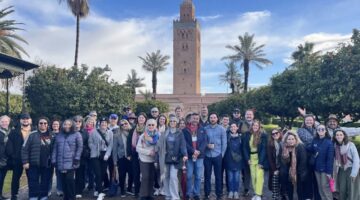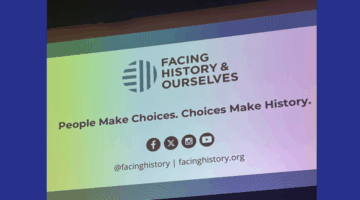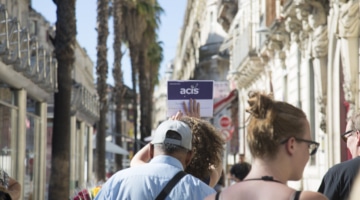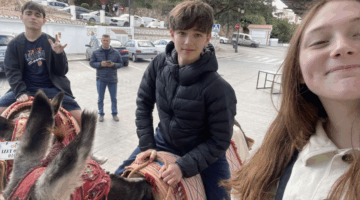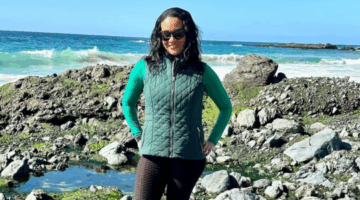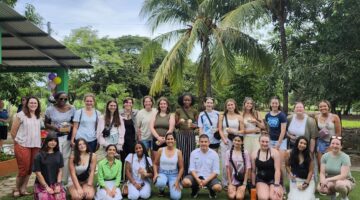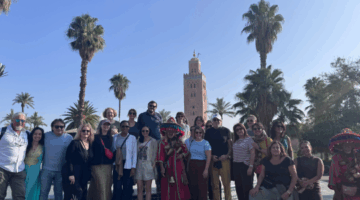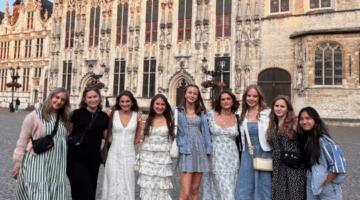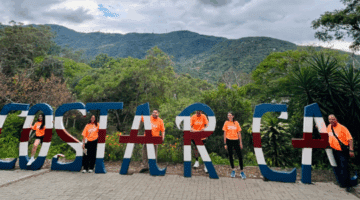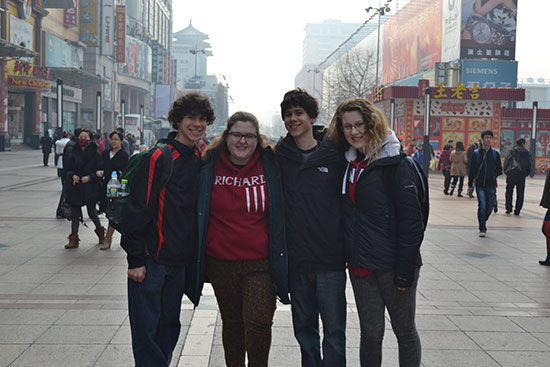
Welcome, Madison! Thanks for sharing your recent travel experiences with us. So I heard your trip to China wasn’t your first time abroad. Can you tell us about that?
Madison: My first trip out of the US was when my family and I went to Paris over Christmas Break in 2011. The biggest difference that comes to mind between these two international experiences would have to be the reasoning behind my travel. Our trip to Paris was scheduled because I was accepted into a class at my school, Lancaster Country Day School (LCDS), called Playing Shakespeare. The Playing Shakespeare course is an acting class that works on a Shakespeare show every year and performs sometime in April.
Since I was studying the French language at the time, Paris seemed a logical option. As for the China trip, things happened a bit differently. When I first joined the Chinese program at LCDS, there weren’t very many students enrolled in the program just yet, since it was only in its second year. When looking at the other languages that Country Day offers, I noticed that French, Spanish, and Latin all had international trips scheduled on an every other year cycle. The French students went to France, the Spanish students went to Spain, and the Latin students went to Italy. One day during class, I asked “If all the other languages have trips, why can’t the Chinese program go to China?” It seemed an absurd idea at the time, but with the help of my Chinese teacher, Wang Laoshi, and the administration at LCDS, it soon became a reality.
Since the Paris trip was not organized through my school, it was entirely up to us what we did and when we did it. Though we hired a tour guide to take us around Paris, I really enjoyed the structure of each day that we had with our ACIS tour guide, Bruce, in China. We went to three cities in China (Beijing, Xi’an, and Shanghai), as opposed to the one we went to in France (Paris).
In each of the Chinese cities, I felt that we covered all of the large tourist areas and still managed to fit a few “extras” in, such as a visit to a local teahouse for a tea ceremony workshop. It was clear that much thought was put into the schedule for each day because there was a nice balance of outdoor/indoor activities. With the expertise of the ACIS company and tour guides, I feel that we were able to both see and do more in the limited time that we had in China than if we would have tried to plan the trip by ourselves. For some of us, our trip this year could very well have been the last time that we are ever in China.
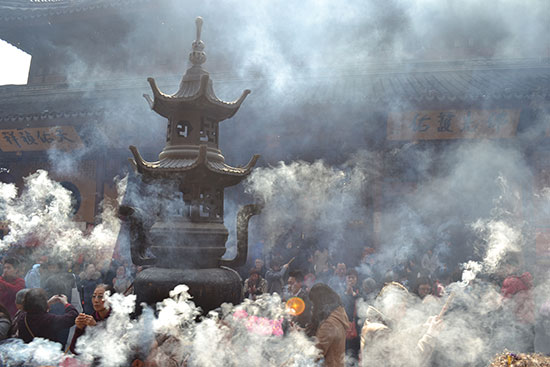
Were there any highlights of your trip to China?
Madison: Of course there are many highlights, but I’d have to say that there are two that really stick out in my mind.
The first was, of course, our fabulous ACIS tour guide, Bruce. Bruce stayed with us through our entire trip. From the beginning to the end of each and every day, Bruce was very energetic and enthusiastic. Not only that, but he always had great historical information on hand for us to put what we were seeing into historical context. I felt that, with Bruce there, we were able to better appreciate what we were looking at and how it fits into the greater whole of Chinese history. He was also extremely friendly, and welcomed any questions. The best times were when we would be walking from one site to another and we would be having a conversation about how a particular aspect of life works in our respective countries. For example, I remember us talking about how the college search process works in China vs. the US. We truly had many “cultural exchanges” throughout the duration of our stay in China, which enriched all participants in the conversation.
The second highlight that I’d like to mention is, simply, the ability to push ourselves by conversing in (Mandarin) Chinese with the local people. It was a remarkable experience to apply what we learned in the classroom to a practical setting. One of my favorite times was when Bruce and Wang Laoshi sent us off on a competitive (but still friendly) scavenger hunt in a market. The goal was to find ten different items in the marketplace and collect the prices (in RMB) of each. Being the only person to have studied any Chinese in my group, I was forced to find creative ways to ask locals for help using the vocabulary I knew. There was this moment, after my first flub, that I correctly asked a question and understood the answer I received in Chinese. Though a minor victory, it felt huge. In hindsight, I think our trip taught me to be more confident in speaking.
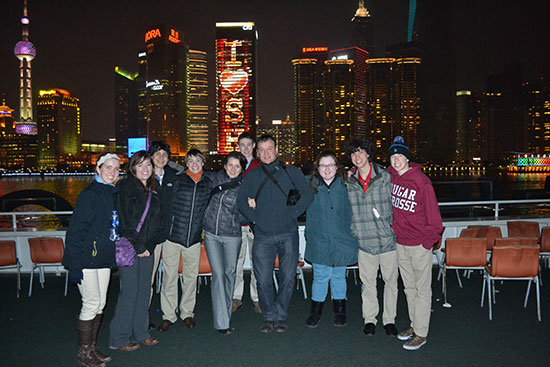
What’s one piece of advice you’d give to other students before their first international trip?
Madison: I’d borrow a piece of advice from my Chinese teacher, Wang Laoshi. When taking a trip to any country, regardless if it is your first trip or your 50th, try your hardest to withhold all judgment. She kindly reminded us of this before we left for China. For me, it’s been a matter of remembering that you are a guest in the culture that you are visiting.
In traveling to another country, you have the rare opportunity to learn about another group of people and how they view the world. Judging things, even subconsciously, that differ from your culture is wasting an opportunity to experience life as the people in the country you are visiting do and become a better citizen of the world.
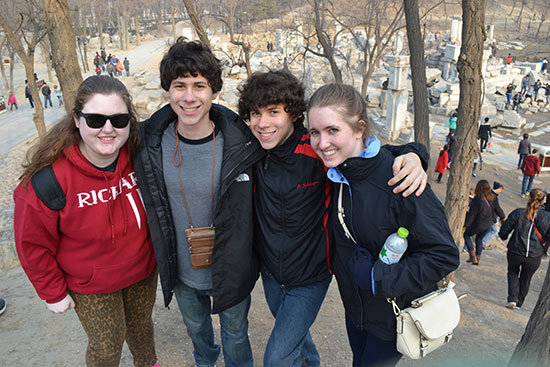
What’s one thing you learned or gained from your travel abroad experience?
Madison: I learned that, regardless of race, age, culture, or language, we, as humans, are all the same. When making this statement, I have two specific instances in mind:
In Beijing, we had the privilege to take a tour via rickshaw of the Hutong area. We saw many children and pets running freely on our way to a local house who generously offered to host us. We were not entirely sure what to expect. Through our Beijing local guide, Joan, and Bruce, we conversed with Madame Wu, our hostess. From the moment we crossed the threshold of her home, Madame Wu wore an enormous smile on her face. One could tell instantly how happy she was to host us.
Through translated conversation, she gushed with pride when she spoke of her three-generation, educated family all living within very close proximity with the house we were sitting in. Towards the end of our Q+A, when asked a question about the Chinese Cultural Revolution, Madame Wu said something that will resonate in my mind for a very long time: “Life isn’t that easy. You have to look at your problems, move on, and keep positive.” As we all grew silent and pondered the significance of what she had just said, I took note of how Madame Wu was, in a literal sense of the phrase, a human ray of sunshine. I can only hope that I may have the honor of aging just like her. Madame Wu’s pride of family and positivity is unmatched in any person I have ever met and deserves to be admired.
The second instance occurred when we visited the Shanghai Urban Planning Exhibition Centre. As Bruce was telling us about the photos of Shanghai as it was beginning and transforming into the city as we know it today, a young Chinese boy of 6 and 1/2 years approached our group curiously. At first he was just passing by, but then it became apparent that he did not want to leave our group. He sprinted over to his mother across the room, and ran back with a gigantic smile on his face, taking a place right next to Bruce.
He must have received permission to stay with us for a little while. The little boy would stand with perfect posture until someone smiled and looked at him, at which time he smiled, giggled, and waved at us, covering his mouth. Like with Madame Wu, I became captivated with his happy, free spirit.
The encounters with Madame Wu and the small child taught me that the human spirit, regardless of its geographic location and external “container,” emotes in the same fashion. I find this incredibly inspiring because, so often, people of the West think that there are enormous voids between themselves and those who live in the East. While large differences do exist, the differences between us only become voids when we permit them to do so.
As an aspiring citizen of the world, I am incredibly thankful for having had the opportunity to learn this lesson so early on in my life and travels.
A big thanks to Madison for sharing her experiences and insights with us! If you have a similar story to share, tell us on Facebook and you could be the center of a future student spotlight story.



